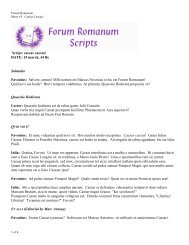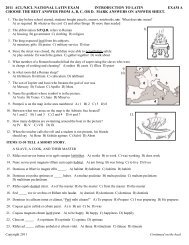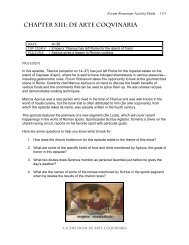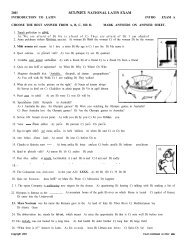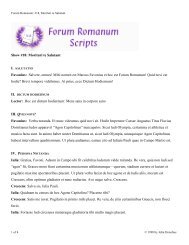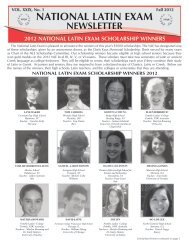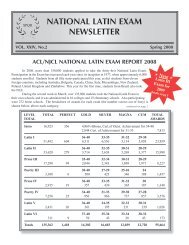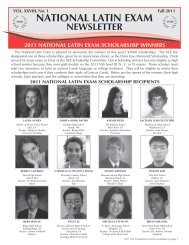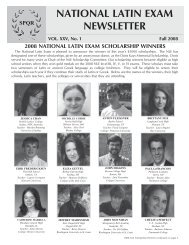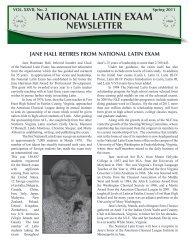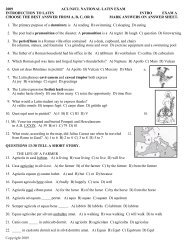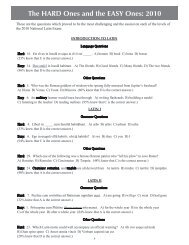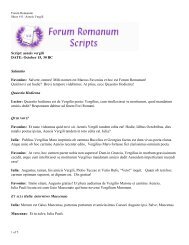You also want an ePaper? Increase the reach of your titles
YUMPU automatically turns print PDFs into web optimized ePapers that Google loves.
24. Dōnum erat parva statua deae Vestae. A) are B) is C) were D) was<br />
25. Puella erat laeta quod māter deam Vestam amābat. A) when B) but C) and D) because<br />
26. Puella ad casam ambulābat, sed ūnus vir malus et magnus in viā stābat. A) one B) angry C) lazy D) good<br />
27. “Dā mihi pecūniam tuam et statuam!” vir clāmābat. A) To give B) Give C) I give D) We give<br />
28. “Cūr?” rogābat puella. A) What B) W<strong>here</strong> C) Why D) Who<br />
29. “Ego pecūniam nōn _____,” vir respondēbat. A) habet B) habēs C) habēmus D) habeō<br />
30. “Sed statua est dōnum,” puella timidē lacrimābat. A) fearfully B) fear C) fearful D) fearing<br />
READ THE REST OF THE STORY AND ANSWER THE QUESTIONS.<br />
THE ROAD HOME<br />
Vir malus statuam puellae ēripere temptābat, sed puella ad 1 ēripere = snatch<br />
vīllam suam currēbat. Puella hunc inimīcum timēbat. Ubi vir 2 suam = her; hunc inimīcum = this unfriendly man<br />
malus ad puellam appropinquābat, puella clāmāre coepit. 3 appropinquābat = was approaching; coepit = began<br />
Amīcus clāmōrēs puellae audiēbat et ad puellam currebat. 4 clāmōrēs = the shouts<br />
Amīcus et inimīcus inter sē pugnābant. Puella perterrita ad 5 inter sē = with each other<br />
agrum proximum festīnābat et auxilium rogābat. Agricolae 6 proximum = nearby; auxilium = help<br />
ex agrō ad pugnam festīnābant. Ubi advēnērunt, inimīcum 7 advēnērunt = arrived<br />
exanimātum in terrā vidēbant. Amīcus in inimīcō sedēbat. 8 exanimātum = unconscious<br />
Amīcus erat victor. Agricolae gaudēbant. Ūnus agricola 9<br />
clāmābat, “Grātiās tibi agimus! Vir malus omnēs in viīs et 10 omnēs = everyone<br />
in oppidō oppugnābat. Nunc habitāre et ambulāre in pāce 11 pāce = peace<br />
possumus.” Puella laeta ad mātrem statuam portat. 12 possumus = we are able<br />
31. In lines 1-2, the girl began to run to her house when A) she tripped and fell B) the bad man cursed at her<br />
C) the bad man tried to steal the gift D) she heard a loud noise<br />
32. In lines 2-3 (Ubi...coepit), when the bad man got closer to the girl she A) ran faster B) shouted C) hid D) fell suddenly<br />
33. In line 4 (Amīcus...currēbat), who came to help the girl? A) a stranger B) a guard C) a soldier D) a friend<br />
34. In lines 5-6, (Puella...rogābat) w<strong>here</strong> did the girl go to ask for help? A) the shops B) a temple C) a field D) the baths<br />
35. In lines 7-8 (Ubi...vidēbant), we learn that _____ was unconscious. A) the unfriendly man B) the girl C) the friend<br />
D) the farmer<br />
36. In line 8, when the men arrived to help, the friend was A) thanking the shopkeeper B) sitting on the man<br />
C) rejoicing with the crowd D) calling the girl<br />
37. In lines 9-10 (Ūnus...agimus), someone A) questions the friend B) thanks the friend C) laughs at the friend<br />
D) curses the friend<br />
38. What has the bad man been doing to people in this town (lines 10-11)? A) lying to them B) following them<br />
C) cursing at them D) attacking them<br />
39. According to lines 11-12, the people in this town are now able to A) walk freely B) swim safely C) sail happily<br />
D) talk openly<br />
40. This story demonstrates that when you help one person, you may A) earn the praise of the gods B) endanger others<br />
C) help everyone D) lose your reputation<br />
Copyright 2013



